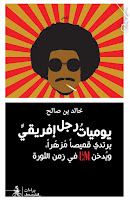(photo credit: Yacine Bouaziz)
Every Friday, for the past 38 weeks*, men and women with their children have been peacefully demonstrating in Algeria, reclaiming public space and demanding a complete overhaul of the political landscape. In the country, these demonstrations are described as part of a larger whole: the "hirak" (less often harak), 'the movement'.
It was of course only a matter of time before the hirak became the main subject in books. So far, non-fiction leads with analyses and commentaries of this nationwide movement, written in Arabic and French, by single authors or collectives, published as early on as May 2019 (demonstrations began on 16 February 2019).
 The hirak has also crossed into poetry and fiction. Khaled Ben Salah's poetry collection "diary of an African man who wears a floral shirt and smokes L&M's in the time of the revolution" was published by El Mutawassit editions in October (see an excerpt in the original Arabic found floating on twitter below). In that month, Koukou editions also announced a new novel by Mohamed Benchicou, hailing it as the "first novel on the hirak". The novel titled 'Casa del Mouradia' is described as a story set 60 years from now, in 2079-2080, narrated by a grand-father to his grand-daughter, and hints at a love story.
The hirak has also crossed into poetry and fiction. Khaled Ben Salah's poetry collection "diary of an African man who wears a floral shirt and smokes L&M's in the time of the revolution" was published by El Mutawassit editions in October (see an excerpt in the original Arabic found floating on twitter below). In that month, Koukou editions also announced a new novel by Mohamed Benchicou, hailing it as the "first novel on the hirak". The novel titled 'Casa del Mouradia' is described as a story set 60 years from now, in 2079-2080, narrated by a grand-father to his grand-daughter, and hints at a love story.It will take time for fiction writers to digest the events still developping today and to bring them into stories and poetry. In the meantime, the below section lists the non-fiction, fiction, and poetry, so far focused on the ongoing Algerian revolution, published in Algeria and by the diaspora.
*38 weeks at the time of writing this article. The demonstrations are set to continue much beyond the elections of December 2019.
Fiction
Mohamed Benchicou - Casa del Mouradia

Blurb:
Poetry
Khaled Ben Saleh (poetry) -
يومياتُ رجلٍ إفريقيّ
يرتدي قميصًا مُزهّرًا
L&M ويُدخِّن
في زمن الثورة
Excerpt:
Non-fiction
(chronological order of publication)
Mahdi Boukhalfa - La révolution du 22 février, de la contestation à la chute des Bouteflika

Rachid Sidi Boumediene - Aux sources du Hirak (Chihab, October 2019)
Karima Aït Dahmane - Vendredire en Algérie. Humour, Chants et Engagement (El Ibriz editions, October 2019)

Mohamed Kacimi - Dissidences, chroniques du Hirak (Franz Fanon, October 2019)
Mhamed Bouazzara - من الصعلكة السياسية إلى الحراك الشعبي (Kitab Alaraby editions, October 2019)
Mohamed Allal - بوتفليقة والزنزانة رقم 5 (Dar el Ouma, October 2019)
Mohamed Metboul - Libertés Dignité Algerianité, avant et pendant le "Hirak" (Koukou éditions, October 2019)

Salah Guemriche - Algérie 2019, la reconquête (Orients editions, 4 octobre 2019)
{chronicles 102 visuals of the demonstrations, with photos and political cartoons}
Azraj Omar - يوميات الحراك الشعبي: نحو تحرير الجزائر من النظام الديكتاتوري (El-khyal editions, September 2019)
collective - La révolution du sourire (Frantz Fanon editions, July 2019)

Touhami Medjouri - من قلب الحراك (Giga books, July 2019)

collective - Marcher (Chihab editions, June 2019)
Abdel Razzaq Boukebba - رماد يذروه السكون: تأملات في الحراك الجزائري (Damma editions, May 2019)













Comments